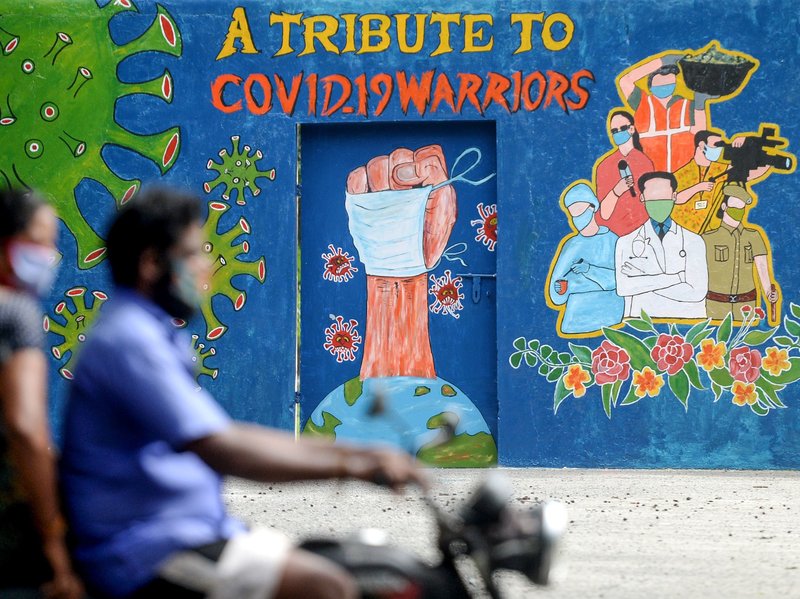World hits grim milestone of 20 million reported coronavirus cases
Tue 11 Aug 2020, 14:26:46

The world has reached the grim milestone of 20 million confirmed coronavirus cases and is edging closer to 750,000 deaths globally, according to figures from Johns Hopkins University.
Case numbers have soared exponentially since the first were reported in China in December.
The world recorded one million cases more than three months later, on April 2. The tally hit 10 million cases less than three months after that, on June 28, and it has taken just six weeks to double.
The seven-day average for new daily cases has been above a quarter of a million for two weeks.
The rise in cases remains driven in large part by the region of Latin America and the Caribbean, as well as by Asia, where cases are growing again, according to the JHU figures. Death rates remain highest in the former.
Brazil has recorded more than three million cases and 100,000 deaths, second only to the United States, which is by far the worst affected country with more than five million cases and 160,000 deaths.
India has the third-highest number of cases at more than two million, reaching the milestone just three weeks after hitting one million. The country is struggling to cope with the fast-growing outbreak, with critically ill patients turned away from hospitals that lack beds, staff and equipment.
However, India's mortality rate remains relatively low, according to JHU data. India has around three deaths per 100,000 or just over 44,000 in total, compared with almost 67 deaths per 100,000 or more than 46,000 in the United Kingdom, which has the highest mortality rate of the top 20 most affected countries.
The UK is among several European countries that are seeing new infection clusters amid fears of a second wave. Stay-at-home orders have been put in place in parts of northern England where outbreaks were identified. The UK recorded 1,113 new cases Sunday, taking its total to more than 310,000.
Spain saw a rapid increase in case numbers last week, with 4,507 new cases recorded on Friday. Daily figures have reached levels not seen since before it ended its state of emergency on June 21, with the country reporting more than 314,000 cases and
28,000 deaths in total.
28,000 deaths in total.
France's top scientists warned last week that its situation is "fragile" and could "change course at any time to a less controlled scenario like in Spain for example." Paris has introduced compulsory mask-wearing in outdoor areas as national daily cases reached 3,897 Friday -- the highest since May. Belgium has also seen a fresh spike -- its weekly average number of new infections rose 62% in the last week of July compared to the previous week, according to the country's health authorities.
Africa confirmed more than one million Covid-19 cases on Friday.
South Africa has more than half the continent's reported cases, with more than 550,000 confirmed infections, the fifth highest count worldwide, and more than 10,000 deaths.
The World Health Organization (WHO) Regional Director for Africa, Dr. Matshidiso Moeti, warned Thursday that the lack of testing across Africa remains a "constant and concerning challenge."
Covid-19 is now spreading among younger people globally, with the proportion of cases among teens and young adults up six-fold, and in young children and babies by seven-fold, WHO said. The increase might be explained by broader testing, greater detection of milder cases and shifting hotspot demographics, but "a rise in risky behavior after easing of public health and social measures" is also to blame, the agency said.
"Behind these statistics is a great deal of pain and suffering," said WHO Director-General Tedros Adhanom Ghebreyesus in a news briefing in Geneva on Monday.
Tedros highlighted countries such as New Zealand and Rwanda as examples of places that are doing well in the fight against Covid-19.
New Zealand celebrated 100 days with no community transmission while Rwanda is seeing progress thanks to similar steps, he said. Testing and treatment are free, people who test positive, and all their potential contacts are visited and tested by health workers.
"I know many of you are grieving, and that this is a difficult moment for the world," Tedros said. "But I want to be clear: There are green shoots of hope and no matter where a country, a region, a city or a town it -- it is never too late to turn the outbreak around."
No Comments For This Post, Be first to write a Comment.
Most viewed from International
Most viewed from World
AIMIM News
Latest Urdu News
Most Viewed
May 26, 2020
Do you think Canada-India relations will improve under New PM Mark Carney?
Latest Videos View All
Like Us
Home
About Us
Advertise With Us
All Polls
Epaper Archives
Privacy Policy
Contact Us
Download Etemaad App
© 2025 Etemaad Daily News, All Rights Reserved.



.jpg)






.jpg)
.jpg)








.jpg)
.jpg)
.jpg)
.jpg)
.jpg)

















